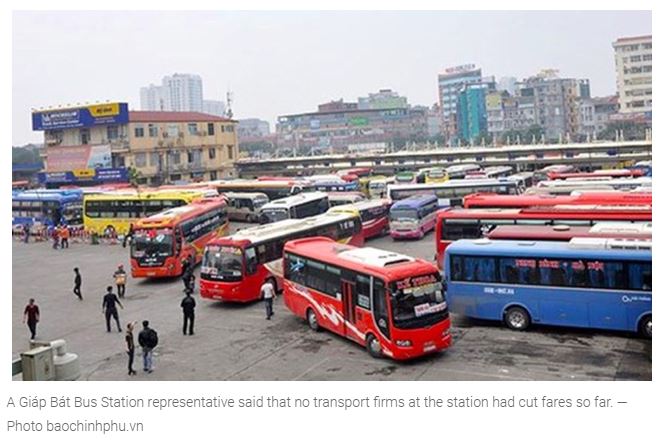Vietnam: Transport firms unwilling to cut fares amid falling fuel prices
Although fuel prices have dropped by around 20 per cent since June, many transport firms are still sitting tight, unwilling to cut fares amid falling costs.
HANOI — Although fuel prices have dropped by around 20 per cent since June, many transport firms are still sitting tight, unwilling to cut fares amid falling costs.
Nguyen Ngoc Anh, an owner of a transport firm operating in the Ha Noi-Quang Ninh-Lao Cai route, said that his firm’s fares have remained unchanged since March.
He said the fares were set at the level to cover the fuel prices of VND26,000 per litre. Current fuel prices are comparable to the figure, ruling out the need for fare cuts.
He also claimed that his firm had not received any requests for fare cuts from its passengers. It will wait for fuel prices to drop further before taking any action.
Nguyen Cong Hung, chairman of the Ha Noi Taxi Association, said that it takes time and money for a transport firm to get its fare cuts approved by the authorities.
Procedurally, a fare proposal needs five to seven days to get a go-ahead. After that, the firm has its fare counters examined by the Registrar Office with a fee of VND100,000 apiece.
Such a time-consuming and costly process has put off many firms, making them reluctant to adjust fares frequently.
“Firms have to think twice about fare cuts because fare adjustments are cumbersome and bureaucratic,” he said.
Do Van Bang, director of the Minh Thanh Phat Ltd., claimed that transport firms ran at a loss when fuel prices soared from VND15,000 to over VND30,000 per litre.
The recent drops in fuel prices were not large enough to help firms turn profits. Accordingly, fare cuts are out of the question.
“Transport firms would reduce fares only when fuel prices drop further,” he said.
The director also stressed that fare reduction are not left to firms’ discretion but need the authorities’ approval to become official.
Because there is a time lag between proposal and approval, the firms have been cautious about fare cuts, fearing that fuel prices would rise once their proposal gets approved.
Khuc Huu Thanh Hai, a representative of the Dat Cang Taxi, shared this view, saying that it is challenging to adjust fares in line with fuel prices since the former is bureaucratic whereas the latter is volatile.
“We are setting our fares at VND14,000 per km. I think fares would decrease if the downward trend of fuel prices become more certain,” he said.
A representative of the Ha Noi Transport Association remarked that most association members had raised fares since fuel prices rose to VND22,000 per litre.
When fuel prices ballooned to over VND32,000 per litre, the firms felt the pinch yet did not raise fares again to cover higher costs.
That means fuel prices dropping to roughly VND26,000 per litre is good news but not enough to offset previous increments. Fare cuts are implausible unless the prices would stay lower.
“Fuel prices have recently slumped to about VND26,000 per litre. The figures are higher than VND22,000, indicating that transport firms are better financially, but not so profitable to think about fare cuts,” he said.
Nguyen Anh Quan, chairman of Taxi G7, revealed that his firm had set its fares lower than market fares to benefit from low price advantages since its establishment in 2018.
The fares have remained stable regardless of fuel price fluctuations for nearly four years, and they are likely to be so in the future.
Nguyen Tat Thanh, director of the Giáp Bát Bus Station, remarked that transport firms at the station made around 500 trips per day between January to June, and none raised fares during the period.
He said fuel prices have sunk for one week, but none has cut fares.
Le Dinh Dung, CEO of the Ha Son-Hai Van Ltd, called for more tax cuts on fuels to slash fuel prices further, providing the ground for fare cuts.
Some firms have decided to go against the prevailing sentiments by pulling off fare cuts to help their passengers. One of the bright spots is Xuan An Travel Vehicles.
The firm claimed it had cut fares on all vehicles in line with fuel prices. For instance, it charged VND900,000 for a 100km trip on 45-seat vehicles when fuel prices were at VND30,000 per litre.
As fuel prices have slid to around VND26,000 per litre recently, the charge has been adjusted to VND840,000.
Many five-seat vehicle owners got in on the act, cutting charges between VND50,000 and VND100,000 per trip at the request of their passengers.
“We follow suit with an average fare cut of between VND50,000 and VND100,000 per trip,” said a vehicle owner.
Thu Phuong, a taxi commuter in Ha Noi, felt that taxi fares have been decreasing slightly compared to last year.
This is because several taxi firms charge VND20,000 for the first 1.3km and VND15,000 for the next. Meanwhile, the charge was VND20,000 for the first 1.48km last year.
Economic experts asserted that recent drops in fuel prices needed at least 10 to 20 days to begin to take root. It is unlikely that the prices of goods and services would fall immediately after the drops.
At the latest price adjustment period, E5 RON 92 petrol was adjusted down to VND25,070 per litre, and E5 RON 95 petrol to VND26,070 per litre. — VNS


 English
English




